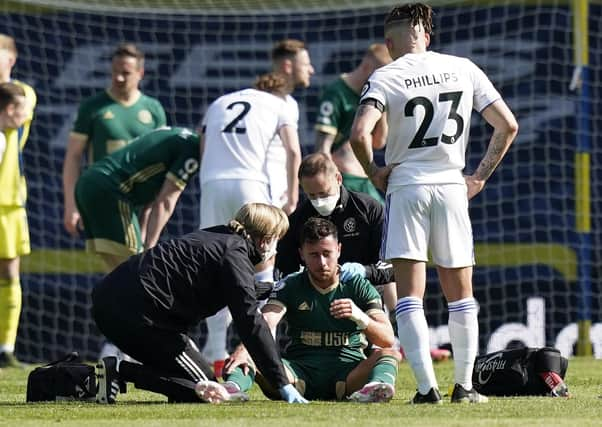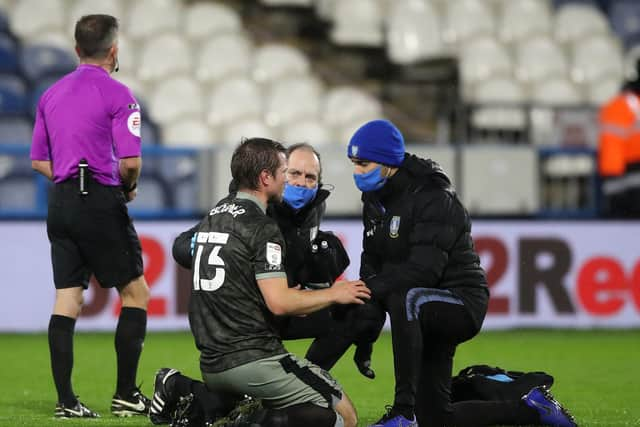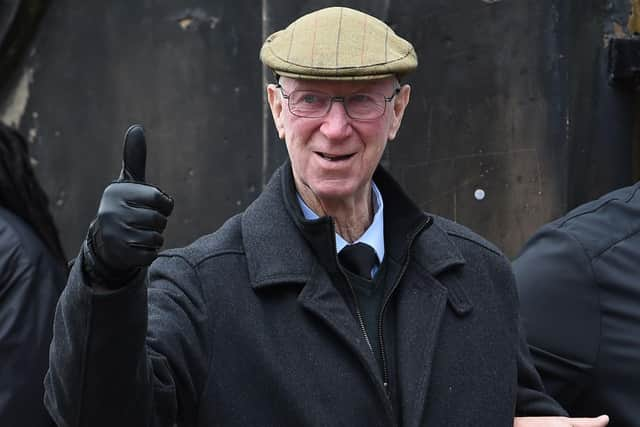Introduction of concussion substitutes is one rule change worth making – Stuart Rayner


The film about Leeds United’s record appearance-maker and England’s World Cup winner, shown on television last week and still available on iPlayer, looks back on a remarkable career (albeit mainly his time as Republic of Ireland manager and his relationship with his brother, Sir Bobby, precious little on life at Elland Road, or managing Sheffield Wednesday and Middlesbrough). But the most powerful parts are footage of Charlton before his death last year, a feeble shell of a man, the flickers of recognition for names and faces once so dear to him frustratingly fleeting.
It ought to be compulsive viewing for those dithering over head injuries in football.
Advertisement
Hide AdAdvertisement
Hide AdCharlton is by no means the only former footballer gripped by dementia. Gordon McQueen, signed to replace him in the role of head-everything-that-comes-near-you centre-back, was recently confirmed as another. So too, following Jack’s death, was his brother, Sir Bobby. Ray Wilson, John Charles, Nobby Stiles, Chris Chilton, Martin Peters, Jeff Astle, Billy McNeill, Jimmy Hill, Dave Mackay, Bob Paisley, Nat Lofthouse, Ferenc Puskas, Gerd Muller, Stan Bowles... they are the tip of the iceberg, and there will be many more beneath the surface whose families do not want their problems aired.


Football is slowly, one gets the impression even reluctantly, starting to act but last week’s Yorkshire derby at Elland Road was a reminder of how much more there is to do.
Two Sheffield United players went off with apparent concussion. As soon as Jayden Bogle took a stray Ezgjan Alioski forearm in the face he was assessed and taken off, but not George Baldock
Baldock came off second best from a clumsy tackle on Tyler Roberts after 33 minutes. Substitute Ethan Ampadu quickly put his shirt on, then headed down the touchline in his tracksuit bottoms to stretch.
Advertisement
Hide AdAdvertisement
Hide AdThe Sheffield United medical staff were thorough in dealing with Baldock. In less enlightened times you might have been frustrated at how long it took or at least that it had to be done on the pitch. Now, though, we understand why.


Eventually, Baldock got to his feet, walked to the touchline and was re-assessed. By that time, Ampadu had put a bib over his shirt. Baldock was sent back on.
In the 45th minute, with only really the time to be added for his on-pitch assessment left (we had four extra minutes), Baldock sat down. His vision was blurred, carrying on was ridiculous. Ampadu finally came on.
It was not the first time this season I had seen something like that. In December, Sheffield Wednesday’s Julian Borner took a bang to the head after about 15 minutes against Huddersfield Town. He underwent the same assessments but from the distance of the press box looked dazed and confused even when he returned. He did not last long before being substituted.
Advertisement
Hide AdAdvertisement
Hide AdNot for a second am I suggesting either medical staff did not do their job professionally and properly. What I am suggesting, as others have, is they did not have enough time to be really sure the players were not concussed, and this is not an issue we should guess on.
In January, the Premier League started a trial of concussion substitutes, and the Blades took advantage against Leeds, which is why Baldock’s overdue removal did not count towards their three permitted changes. It was a welcome step but as so often with football on this issue, not far enough.
The Blades should have had the option of bringing Ampadu on immediately, and swapping the players back over if Baldock was not concussed. In rugby union temporary concussion substitutes can appear for up to 12 minutes of playing time until a final decision.
“Players need to be properly assessed away from the crowd and the television cameras and they need a good 10 minutes,” surgeon Bill Ribbans told me in December. “The HIAs (head injury assessments) in rugby and cricket are quite a weighty document (four dense pages of A4). To go through that very objectively takes time.”
Advertisement
Hide AdAdvertisement
Hide AdLinks between dementia and regularly heading footballs – be they the heavy leather ones Charlton bullied or the lighter ones which can be smashed at so much greater speed – are still to be conclusively proven but the circumstantial evidence is becoming weighty. With research published yesterday suggesting a link between Covid-19 and dementia, this generation of players have other factors against them.
Looking too hard into it might open a raft of legal cases but taking risks with the current generation of millionaires is a far bigger gamble.
You surely do not need to be a brain surgeon, though, to work out that getting knocked out is not great for the grey matter.
Seeing Baldock, Borner and others head back onto the field was deeply uncomfortable.
Advertisement
Hide AdAdvertisement
Hide AdConcussion substitutes will change the game and, like blood substitutes in rugby, could be exploited by the unscrupulous. If it means one less footballing hero reduced to what Charlton was, sign me up any day.
Support The Yorkshire Post and become a subscriber today. Your subscription will help us to continue to bring quality news to the people of Yorkshire. In return, you’ll see fewer ads on site, get free access to our app and receive exclusive members-only offers. Click HERE to subscribe.
Comment Guidelines
National World encourages reader discussion on our stories. User feedback, insights and back-and-forth exchanges add a rich layer of context to reporting. Please review our Community Guidelines before commenting.